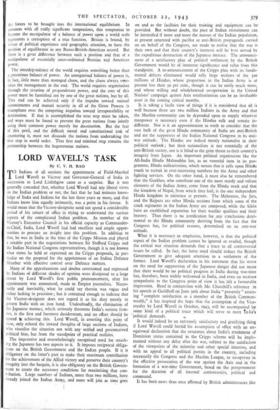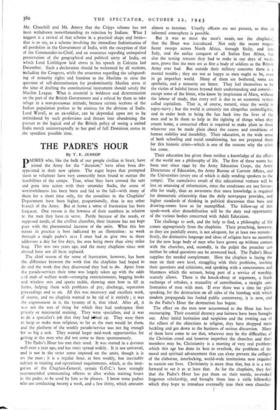LORD WAVELL'S TASK
By C. V. H. RAO
rlo Indians of all sections the appointment of Field-Marshal Lord Wavell as Viceroy and Governor-General of India in succession to Lord Linlithgow came as a surprise. But it was generally conceded that, whether Lord Wavell had any liberal views on the Indian problem or not, the fact that he had intimate know- ledge of India and Indians for the last three years or more, and that Indians know him equally intimately, was a point in his favour. It would mean that the Viceroy-designate need not spend a considerable period of his tenure of office in trying to understand the various aspects of the complicated Indian problem. As member of the Viceroy's Executive Council in his official capacity as Commander- in-Chief, India, Lord Wavell had had excellent and ample oppor- tunities to procure an insight into this problem. In addition to that, he was in India at the time of the Cripps Mission and played a notable part in the negotiations between Sir Stafford Cripps and the Indian National Congress representatives, thOugh it is not known what views he held or expressed on the Cripps proposals, in par- ticular on the proposal for the appointment of an Indian Defence Member with effective control over Defence matters.
Many of the apprehensions and doubts entertained and expressed by Indians of different shades of opinion were dissipated to a large extent by Lord Wavell's first public pronouncement, after his appointment was announced, made to Empire journalists. Neces- sarily and inevitably, what he could say therein was vague and rather lacking in precision ; but it contained enough to indicate that the Viceroy-designate does not regard it as his duty merely to govern India with an iron hand. Undoubtedly, the elimination of the Japanese menace, which seriously threatens India's eastern fron- tier, is the first and foremost desideratum, and no effort should be Tared im achieving this. Lord Wavell, in asserting this point of %-iew, only echoed the inward thoughts of large sections of Indians, .rho visualise the situation not with any settled and preconceived :aolitical bias, but from the standpoint of practical realities.
The imperative and overwhelmingly recognised need for smash- ing the Japanese has two aspects to it. It imposes reciprocal obliga- tions on the British Government and the Indian people. If it is obligatory on the Litter's part to make their maximum contribution for the achievement of the Allied victory and preserve their country's integrity into the bargain, it is also obligatory on the British Govern- ment to create the necessary conditions for maximising that con- tribution. Large number:. of Indians, more than two millions, have already joined the Indian Army, and more will join as time goes
on and as the facilities for their training and equipment can be provided. But without doubt, the pace of Indian recruitment can be intensified if more and more the masses of the Indian population, at present saturated with pacifist or anti-British propaganda carried on on behalf of the Congress, are made to realise that the war is their own and that their country's interests will be best served by the expeditious destruction of the Japanese menace. The announce- ment of a satisfactory plan of political settlement by the British Government would be of immense significance and value from this standpoint. A re-announcement of the Cripps plan with its funda- mental defects eliminated would rally large sections of the 300 millions of Hindus, whose proportion in the Indian Army is at present less than 5o per cent., though it can be easily much more, and whose willing and wholehearted co-operation in the United Nations' campaign against Axis totalitarianism can be an invaluable asset in the coming critical months.
It is taking a facile view of things if it is considered that all is well because there are two million Indians in the Army and that the Muslim community can be depended upon to supply whatever manpower is necessary even if the Hindus sulk and remain in- different. Nor is it an approximation to truth to consider that the vast bulk of the great Hindu community of India are anti-British and are the supporters of the Indian National Congress in its anti- war attitude.. The Hindus are indeed mostly nationalist in their political outlook ; but their nationalism is not essentially of the anti-British variety, nor is it blind to the grim threat to their country's integrity from Japan. An important political organisation like the All-India Hindu Mahasabha has, as an essential item in its pro- gramme, Hindu militarisation, which means that it calls upon Hindu youth to recruit in ever-increasing numbers for the Army and other fighting services. On the other hand, it must also be remembered that the Gurkhas, who constitute one of the most sturdy and valiant elements of the Indian Army, come from the Hindu stock and that the kinedom of Nepal, from which they hail, is the one independent Hindu kingdom in existence at present. The Mahrattas, the Jets, and the Rajputs are other Hindu sections from which some of the crack regiments in the Indian Army are composed, while the Sikhs have an established reputation for their warlike qualities and their bravery. Thus there is no justification for .any conclusions detri- mental to the Hindu community deriving from the fact that the Congress has, for political reasons, determined on an ann-war attitude.
What it is necessary to emphasise, however, is that the political aspect of the Indian problem cannot be ignored or evaded, though the critical war situation demands that a truce to all controversial issues be called. In fact, the latter need should induce the British Government to give adequate attention to a settlement of the former. Lord Wavell's declaration in his statement that his stress on the need for suppression of the Japanese danger did not mean that there would be no political progress in India during war-time has, therefore, been widely welcomed in India, and even on sections sympathetic to the Congress point of view it has left a favourable impression. Read in conjunction with Mr. Churchill's reference in his speech at Guildhall on June 3oth about India " presently " attain- ing " complete satisfaction as a member of the British Common- wealth," it has inspired the hope that the assumption of the Vice- royalty by Lord Wavell in October, 1943, will be accompanied by some kind of a political truce which will serve to meet India's "political demands.
It would indeed be an extremely satisfactory and gratifying thing if Lord Wavell could herald his assumption of office with an un- equivocal declaration that the assurance about India's attainment of Dominion status contained in the Cripps scheme will be imple- mented without any delay after the war, subject to the satisfaction of the viewpoints of the minority and other special interests, and with an appeal to all political parties in the country, including necessarily the Congress and the Muslim League, to co-operate in the effective prosecution of the war against the Axis - and in the formation of a war-time Government, based on the postponement for the duration of all internal controversies, political and communal.
It has been more than once affirmed by British administrators like Mr. Churchill and Mr. Amery that the Cripps scheme has not been withdrawn notwithstanding its rejection by Indians. What I suggest is a revival of that scheme in a practical shape and form— that is to say, as a scheme involving the immediate Indianisation of all portfolios in the Government of India, with the exception of that of the Commander-in-Chief, and an assurance regarding unimpaired preservation of the geographical and political unity of India, on which Lord Linlithgow laid stress in his speech in Calcutta last December. Such a declaration should be welcomed by all sections, including the Congress, while the assurance regarding the safeguard- ing of minority rights and freedom to the Muslims to raise the question of self-determination for predominantly Muslim areas at the time of drafting the constitutional instrument should satisfy the Muslim League. What is essential is boldness and determination on the part of the British Government and a refusal by them to take refuge in a non-possumus attitude, because certain sections of the Indian population profess to be anxious for the division of India. Lord Wavell, as an ex-soldier, can be depended upon not to be intimidated by such professions and threats into abandoning the pursuit to the logical end of the British policy of seeing a united India march uninterruptedly to her goal of full Dominion status in the speediest possible time.



























 Previous page
Previous page